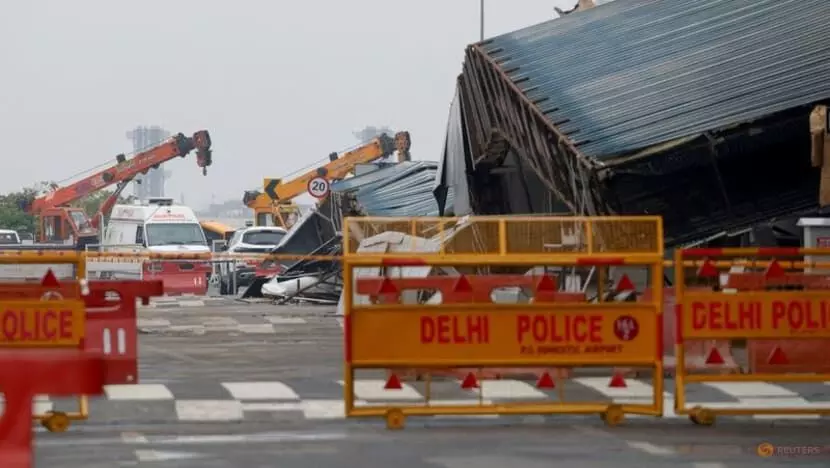Delhi airport T1 incident: IIT Delhi's structural engineers likely to complete assessment in one month
All SpiceJet flights to/from Delhi from July 1 to 7 will operate from Terminal 3.
By Newsmeter Network
New Delhi: Structural engineers from IIT Delhi, engaged by the civil aviation ministry, are expected to complete an independent assessment of the portion of the canopy collapse incident at Delhi airport's T1 in a month's time, according to a senior official.
After a thorough assessment of the findings and taking into consideration other aspects, the decision will be taken on restarting operations at the terminal.
All flights from T1 have been shifted to Terminal 2 (T2) and Terminal 3 (T3), and all of them were being operated, the senior government official said.
On June 28, a canopy at the old departure forecourt of T1 partially collapsed amid heavy rains resulting in the death of a person and causing injuries to at least six people. Following the incident, the civil aviation ministry said structural engineers from IIT Delhi have been asked to immediately assess the partial collapse of the canopy.
The official said the ministry is engaging structural engineers from IIT Delhi to do an independent assessment of roof collapse incident at T1 and they are expected to complete the assessment in one month. After the findings come in, a decision will be taken about recommencing operations at T1, the official added.
The Indira Gandhi International Airport (IGIA), operated by a GMR Group-led consortium DIAL, has three terminals -- T1, T2 and T3 -- and handles around 1,400 flight movements daily.
T1 was used for domestic flight operations by IndiGo and SpiceJet.
From T1, the official said 72 flights of IndiGo have been shifted to T2 and T3, and 17 flights to T3, adding that all the flights are operational.
Civil Aviation Minister K Rammohan Naidu held a meeting with senior officials from regulators, airport operator DIAL and airlines to review the measures in place to ensure smooth functioning and deployment of additional manpower to manage the increased passenger movements at T2 and T3.
Naidu visited the Airport Operations Control Centre (AOCC) on Sunday to review the operations as T2 and T3 are now also handling the traffic of T1.
As per an update provided by the ministry on Monday, the war rooms to help passengers have been activated and close coordination between DIAL and airlines is being facilitated.
"All SpiceJet flights to/from Delhi from 1st till 7th Jul'24 will operate from Terminal 3, Delhi Airport. Necessary information has been communicated to all the passengers on their registered contact details (SMS/Email)," the airline said in a post on X on Sunday.
Two sources in the know said it might take a few months before operations can resume at T1.
In response to a set of detailed queries related to T1, DIAL on Sunday said its cross-functional teams are actively evaluating the situation and engaging with various stakeholders to ensure passenger safety and convenience.
"We remain committed to maintaining flight operations at T3 and T2, while operations at T1 are temporarily suspended. We appreciate the understanding and support of all stakeholders," a DIAL spokesperson said in a statement on Sunday.
To queries about business loss of concessionaries operating shops and services at T1, the spokesperson had said as the evaluation process is still ongoing, it is too early to provide specific inputs.
As a precautionary measure, all flight operations from T1 have been suspended till further notice. The expanded T1, the capacity of which has increased to handle 40 million passengers from 17 million, is yet to be fully operational.
"While the cause for the collapse of the canopy is being assessed, the primary cause seems to be the heavy rainfall. As per the Indian Meteorological Department on Friday, Delhi Safdarjung had recorded massive 228.1mm of rain in 24 hours (mainly in the early morning hours of Friday).
"This is the highest 24 hours of rain in Delhi in June in 85 years. The average rainfall in the area in the last 30 years is 75.2 mm," the spokesperson said in the statement on Sunday.
The roof collapse incident will be probed by the Directorate General of Civil Aviation (DGCA) as well as by a technical committee set up by DIAL.
On June 28, the ministry announced that 24x7 war rooms will be set up under its close monitoring. "The war room will ensure the full refund of cancelled flights or provide alternative travel route tickets as per availability. All refunds will be processed within a stipulated time of 7 days," the ministry had said in a statement.
Meanwhile, the Airports Authority of India (AAI) has been directed to issue a circular to all minor and major airports to conduct a thorough inspection of structural strength.
"Based on the findings, the need for increased safety measures and the development of long-term policies to prevent the recurrence of such unfortunate incidents will be formulated at priority," the ministry said in the statement.
Flight Operations and Passenger Accommodations:
IndiGo:
- Total Passengers Impacted: 21,690
- Accommodated on Alternate Flights: 12,194
- Tickets Cancelled and Refunded: 9,431
Refund Methods:
- Debit/Credit Card: 1,699
- Agency: 7,680
- Others (Vouchers/Credit Shells): 52
- Pending Refund or Alternate Flight: 62 passengers
Operational Adjustments:
- Scheduled flights from T1: 72
- Departures moved to T2 and T3: 71
- Increased manpower and wheelchair resources at T2 and T3.
SpiceJet:
- Total Passengers Impacted: 925
- Alternate Arrangements Made: 250
Refunds Processed:
- Direct Credit (Debit Card): 6
- Indirect Credit (Credit Card/OTP/Agency): 535
-Pending Cancellation/Refund: 134 passengers
Operational Adjustments:
- Flights shifted to T3: 15
- Cancellations: None